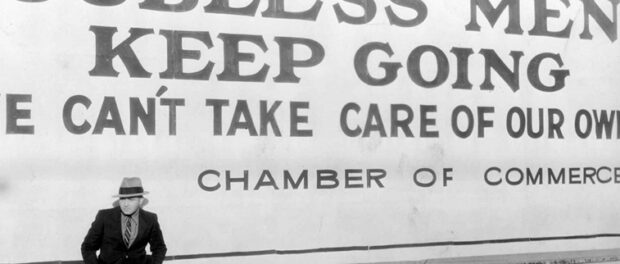Heroes for Sale (1933)
[7]
Heroes for Sale follows Tom Holmes (Richard Barthelmess) through a near-death experience on the World War I battle front to a resulting morphine addiction upon his return to America. We see him lose his job and get rehabilitated, only to suffer another blow when his lucrative investment in washing machines puts hard-working Americans out of work. When he leads a worker’s strike that turns violent, he’s imprisoned for five years. The war hero ultimately finds himself wandering from town to town with other men, looking for employment during the Great Depression.
The screenplay for Heroes for Sale may feel a bit scattershot in its aim, and Holmes’ constant self-sacrifice feels a little forced at times, but the film is very interesting as a ‘sign of the times’ story. It encapsulates so much of what early 1930s America was experiencing at the time — the fallout from the first World War, unemployment and bread lines, the start of automation, labor riots, the Red Scare, and more. Its sympathetic portrait of drug addiction feels far ahead of its time. It also presents interesting arguments, for and against, both capitalism and communism.
It’s exactly the sort of movie you might expect from socially conscious filmmaker William Wellman (The Ox-Bow Incident, The Story of G.I. Joe), who encouraged America to take pause and reflect on itself in so many of his films. His handling of the violent worker’s riot gives the film its most visceral highlight. The sequence results in personal and professional tragedy for Holmes, who sees his wife trampled to death before the police take him away in handcuffs. While his character borders on saintly, Barthelmess gives as subtle a performance as possible. Aline MacMahon is also memorable as Holmes’ landlady who holds a flame for him, and ends up taking care of his young son while Holmes serves out his prison sentence.
Heroes for Sale‘s unconventional storytelling is far from propagandist. It’s ambiguity toward communism and capitalism would never have been permitted a few years later, when the Hays Production Code would be more strictly enforced. The dreary open ending is also unusual, but it certainly holds a mirror up to audiences of its time, many of them hanging on to the American Dream through the toughest of times. After finishing the movie, I had to wonder if John Steinbeck saw it before he wrote The Grapes of Wrath. I wouldn’t be surprised if Tom Joad owed a debt to Tom Holmes.
With Loretta Young, Gordon Westcott, and Charley Grapewin.


